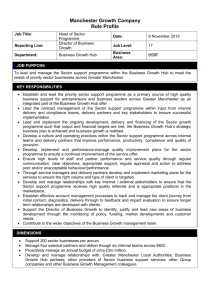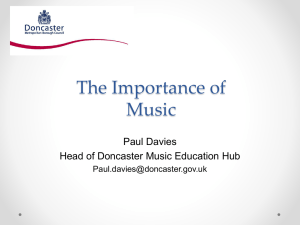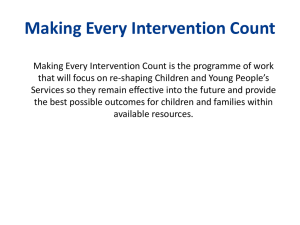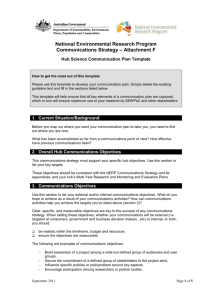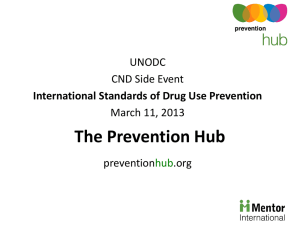Item 4 - Hampshire County Council
advertisement
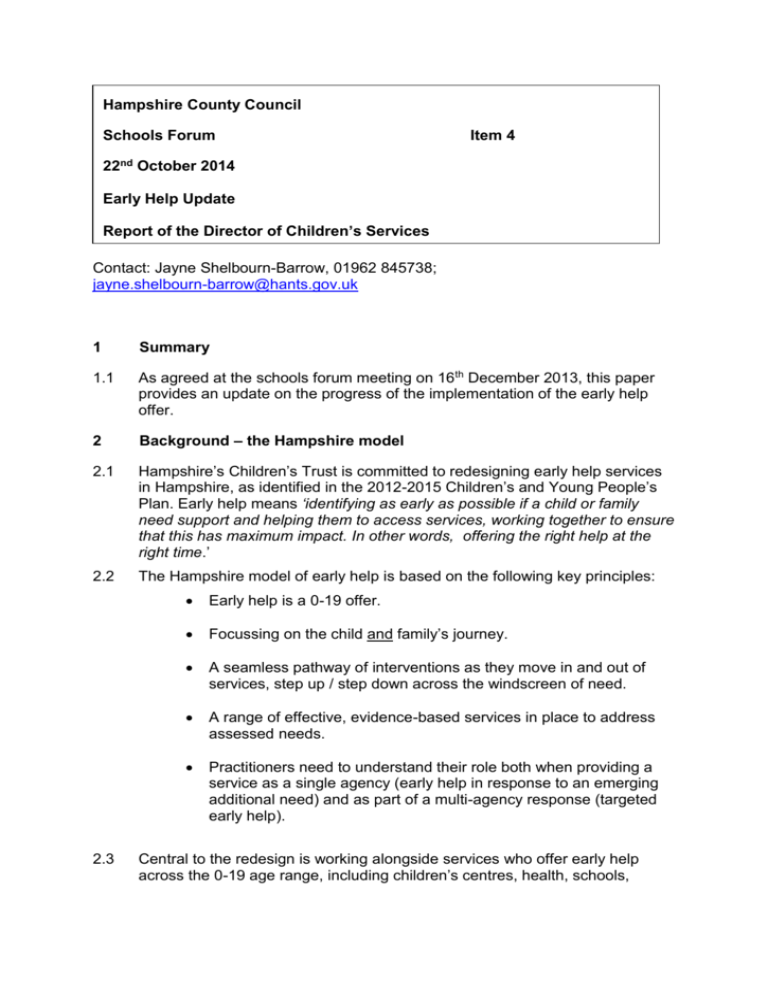
Hampshire County Council Schools Forum Item 4 22nd October 2014 E Early Help Update Report of the Director of Children’s Services Contact: Jayne Shelbourn-Barrow, 01962 845738; jayne.shelbourn-barrow@hants.gov.uk 1 Summary 1.1 As agreed at the schools forum meeting on 16th December 2013, this paper provides an update on the progress of the implementation of the early help offer. 2 Background – the Hampshire model 2.1 Hampshire’s Children’s Trust is committed to redesigning early help services in Hampshire, as identified in the 2012-2015 Children’s and Young People’s Plan. Early help means ‘identifying as early as possible if a child or family need support and helping them to access services, working together to ensure that this has maximum impact. In other words, offering the right help at the right time.’ 2.2 The Hampshire model of early help is based on the following key principles: 2.3 Early help is a 0-19 offer. Focussing on the child and family’s journey. A seamless pathway of interventions as they move in and out of services, step up / step down across the windscreen of need. A range of effective, evidence-based services in place to address assessed needs. Practitioners need to understand their role both when providing a service as a single agency (early help in response to an emerging additional need) and as part of a multi-agency response (targeted early help). Central to the redesign is working alongside services who offer early help across the 0-19 age range, including children’s centres, health, schools, locality teams, youth provision, the voluntary sector, local and district borough councils and social care. 2.4 The use of common language and terminology is key to ensure the success of the redesign of early help services. 2.5 The redesign of early help services focuses on those children, young people and families that fall below the threshold for children’s social care interventions 3 Overview of progress – key areas of work 3.1 Governance arrangements There are regular reports to Hampshire Safeguarding Children’s Board (HSCB) and Hampshire Children’s Trust Board. Discussions are underway in relation to the Local Children’s Partnerships (LCPs) and future governance arrangements linked with the 10 early help hubs model. At a district level, short term working groups have been established, linked with the LCPs to oversee the introduction of the early help hub, including the hub venue, multi-agency launch event, hub representation and communications with partner agencies. Schools have been involved in the working groups for Gosport, Test Valley, Basingstoke, Hart and Rushmoor, New Forest, Havant and East Hants. Representation has been both Head teachers and Deputy Head teachers. There is a county implementation board for early help chaired by the Deputy Director, Children’s Services and a county roll out group to oversee the implementation. Both of these groups are multi-agency. 3.2 Review of thresholds of need In line with ‘Working Together to Safeguard Children (2013)’, a new thresholds document, as approved by the Children’s Trust and HSCB, has been produced that includes: How the provision of early help services form part of a continuum of help and support to respond to the different levels of need of individual children and families. The process for the early help assessment and the type and level of early help services to be provided; and The criteria, including the level of need, for when a case should be referred to local authority children’s social care for assessment and for statutory services. 3.3 Early help assessment Following a review of the Common Assessment Framework (CAF), a new early help assessment tool has been produced allowing a range of agencies to contribute to the assessment process. There is one assessment per family leading to one family plan. The early help assessment is being rolled out alongside the county roll out of early help hubs. Following a 6 month review of the Eastleigh pilot, the early help assessment paperwork is being reviewed and updated – this includes bringing together one set of paperwork for both early help and the ‘Supporting Families’ programme. 3.4 Performance and outcomes measures The following measures have been identified as the most useful to collect to monitor and measure the performance of the Early Help Hub and to evidence the role of early help and the impact on the child and family, Number of families being worked with at level 3 Number of early help assessments completed Length of time open to the hub Who is making the request for support to Level 3 Reason for request for support Re-entry to level 3 hub from level 2 when stepped down in past Number of cases stepped up from level 3 to 4 Number of cases stepped down from level 4 to 3 Who is undertaking the role of early help coordinator In addition to these performance measures, individual hubs will be expected to report the following; Number of cases at level 2 being supported by level 3 (calls into consultation line, issues raised, help and guidance offered, source of call). This information will be collated and used to inform local commissioning arrangements. Distance travelled data - the distance travelled tool is used by the practitioner. The top priority areas will be agreed with the family as part of the early help plan. The practitioner will complete the tool Feedback from the family – this will be collated from both the young person and the parent/carer and will include views on the contact received, involvement in the assessment and plan, the interventions and the outcomes of the interventions. See Appendix 2 for data from hubs at 31.7.14. 3.5 Communications and Training The multi-agency launch events have been well attended with representation across both statutory and voluntary services. All schools and education settings have been invited to their launch event. Representation has been as follows: Infant Junior Primary Secondary Special Ed Centre Eastleigh 7 6 12 6 Gosport 23 8 8 6 Test Valley 6 4 19 9 3 B’stoke 13 8 5 16 2 1 Hart & Rushmoor 13 10 11 9 2 1 New Forest 10 7 3 11 Havant 6 7 10 5 1 1 3 Following the launch event there are opportunities to attend early help assessment training – this has predominantly been attended by locality teams, children’s centre staff, health visitors and schools. A hub workshop is held prior to the commencement of the hub to discuss practicalities around how the hub will operate; this includes agreement around a memorandum of understanding in respect of information sharing. A training needs analysis is undertaken with hub members after approximately 4-6 weeks of meetings. Strengths are identified as well as gaps to inform training needs. The early help web pages are in development and will include county and local hub information. 4 The Early Help Hub – update on implementation 4.1 As of 08.09.14, there are seven hubs operational – Eastleigh, Gosport, Test Valley, Basingstoke, Hart & Rushmoor, New Forest and Havant. All 10 hubs will be operational by the end of November. Appendix 1 shows the roll out plan and contact information. 4.2 The early help hub operates at level 3 and provide interventions with children and families that meet the level 3 threshold, both step up from level 2 and step down from level 4. 4.3 The early help hub is managed by an early help hub manager, (formerly locality manager) and provides a daily consultation line 08.30-12.30. The consultation line provides support to schools and practitioners around the early help offer, assessment, services etc. 4.4 There is a weekly hub meeting which a range of practitioners attend: Agencies / services signed up to the hub provision to date include: Hampshire County Council Locality team, including Youth Crime Prevention and link with Legal Intervention Team Children’s Centres Community Development Facilitator role within Youth Support Commissioning Adult Social Care – Substance Misuse Team CAMHS – Primary Mental Health Worker Health Visiting School Nursing Young People’s Substance Misuse service NEET provision / post 14 work Police Housing Domestic abuse Young carers Sexual Health Services Ethnic Minority Service Traveller Service A register of attendance is kept and forms part of the quarterly report to the local Multi-Agency Safeguarding Forum. There are discussions underway with GP’s in relation to their involvement in the early help pathway and there is currently a gap in relation to Adult Social Care, Adult Mental Health and Adult Learning Disability. There is close alignment with the Supporting Troubled Families programme at a county level and each hub area is working closely with Supporting Troubled Families to look at working arrangements. 4.5 The purpose of the weekly hub meeting is to discuss and allocate families that have been identified as requiring Level 3 targeted early help. Each ‘family’ will be discussed at the meeting following the completion of the early help assessment – this assessment is commenced at Level 2. A decision will be made at the meeting who will take on the role of early help coordinator linked to each child and family plan who will ensure regular reviews of the plan and progress. The early help coordinator role can be undertaken by a range of practitioners, determined by the needs of the child and family. To date this role has been undertaken by children’s centre family support worker, locality team family support worker, parent support advisor, school nurse, health visitor and Transform (Supporting Troubled Families programme). 4.6 Schools engagement in the weekly hub meetings. There have been discussions in each district in relation to schools involvement in the weekly hub meetings. Schools are always invited to attend to discuss a family where a request for support at Level 3 has been made – however, attendance is not mandatory and the work will be discussed and allocated as per the process if the school do not attend. To date there is consensus that weekly representation at the meeting is beneficial as it brings a level of expertise and challenge to the multi-agency group. Schools in Test Valley have proposed a rota linked with schools clusters to enable school representation on a weekly basis. There are similar discussions underway in other areas. Discussions are also underway in each district with regards to how schools and schools clusters link with the early help hub. An example of this is agreement that the hub manager will attend cluster meetings for discussion and feedback. 5. The Level 2 Early Help Offer 5.1 The early help hub supports the on-going development of the locality early help offer at level 2 by: Providing expertise and consultation via a telephone duty system, 8.30 – 12.30 Monday to Friday. Signposting to services Providing support and challenge to agencies re their involvement at Level 2 and 3 Access to training opportunities 5.2 The local service directory information is being collated. This is a shared project with Supporting Troubled Families. There has been a delay in securing IT capacity to develop the web pages. There is further developmental work to undertake around the level 2 offer. 6. Eastleigh Early Help Pilot 6.1 Between 21.1.14 and 31.07.14, there were 40 ‘new’ early help assessments involving 99 children and young people. This figure does not include the level 3 cases already open to locality teams at the commencement of the hub arrangements. It also does not include the step down cases form level 4. 6.2 Attendance at the weekly meetings has been consistent and members have particularly welcomed the regular contribution of Adult Social care substance misuse, CAMHS and the Department for Work and Pensions (DWP). 6.3 The early help assessment form has been amended in light of the pilot and a review workshop was held in September. 6.4 A 6 month review hub meeting was held in July to get feedback from partner agencies and look at areas for development. 7. Finance 7.1 The estimated cost of the 10 hubs is £3.3m, approximately £330,000 per hub, made up of the following elements: £000 Strategic Early Help & Partnerships Manager Early Help Hub Manager x 8 Assistant Early Help Hub Manager x 2 Early Help Social Workers x 8 Family Support Workers x 48 Family Support Worker (youth lead) x 10 Administration support x 9 Youth Crime Prevention Officers x 18 Total staff costs Non staff costs, including building, IT, phones, mileage, support funds for families Total costs 67 384 77 309 1,440 300 216 340 3,133 197 3,330 8. 8.1 Recommendations: Schools forum note the progress of the implementation of the early help offer 8.2 Schools forum suggest ways forward in relation to the future engagement of schools in relation to the development of the offer. Appendix 1: Early Help Hub contacts – version 1st September 2014 Hub Manager Hub start Email address Eastleigh Julie Alden 21.01.14 Gosport Steph Morley Test Valley Julie Lawrence Basingstoke Rebekah Kundi venue Weekly allocation meeting eastleigh.EarlyHelpHub@hants.gov.uk Consultation line (not to be given to parents) 02380 624728 Chamberlayne Children's Centre, Chamberlayne Road, Eastleigh Hampshire SO50 5JL Wednesday 1000 - 1200 28.04.14 Gosport.EarlyHelpHub@hants.gov.uk 02392 572677 Tuesday 0930-1200 19.05.14 testvalley.ehh@hants.gov.uk 01264 387453 02.06.14 basingstoke.earlyhelp@hants.gov.uk 01256 776146 Rowner Children's Centre, Nimrod Dr, Gosport, Hampshire PO13 8AA Water Meadow Children's Centre, Old London Rd, Stockbridge, Hampshire SO20 6EJ (consultation line not from there currently) Pebbles Children's Centre, Shakespeare Road, Popley, Thursday 1300 - 1500 Thursday 0930 - 1130 Hart & Rushmoor Fiona Wraith 16.06.14 hartandrushmoor.earlyhelp@hants.gov .uk 01252 796324 New Forest Debra Cusack 07.07.14 newforest.earlyhelp@hants.gov.uk 02380 627735 Havant Andy Kennedy 08.09.14 havant.earlyhelp@hants.gov.uk 023 9247 5503 East Hants Sharon Davies tbc – 03.11.14 Work flow not switched locality to early help yet sharon.davies@hants.gov.uk Fareham Steph Morley tbc 10.11.14 Winchester Julie Alden tbc 17.11.14 Work flow not switched locality to early help yet Stephanie.morley@hants.gov.uk Work flow not switched locality to early help yet julie.alden@hants.gov.uk Basingstoke, Hampshire RG24 9BP Rushmoor Borough Council, Farnborough Rd, Farnborough, Hampshire GU14 7JU Cadland Children's Centre, Whitefield Road, Holbury, Southampton SO45, 2HW Public Service Plaza Civic Centre Road Havant PO9 2AX Tuesday 1300 - 1500 Thursday 0930 - 1130 Wednesday 0930 - 1130 Appendix 2: Data from operational hubs at 31.07.14 Note: hubs have been operational for varying lengths of time so direct comparisons not possible. Eastleigh 21.01.14 – 31.07.14 Measure Comment Number of families Cases open 121 – involving 54 families being worked with at level 3 Step down from social care – 63 Step up from schools and agencies – 58 Closed cases 35 – due to move out of area, step up to level 4, support no longer being required. 40 completed which involves 99 children/young people. In addition 1 CAF assessment received. On average between 6 weeks and 5 months Number of Early help assessments completed Length of time open to the hub Who is making the Schools for majority of cases reflected in authoring of Early request for support Help Assessments on 28 occasions, YOT, primary Behaviour to Level 3 Support, CAMHS 2, Health Visitor 4, Portage Service 1, PSA 1, Nursery 1 Reason for Behaviour issues, lower level neglect, additional needs such request for support as child with special needs, attendance, domestic abuse, adults with mental health issues, financial issues, parenting, housing, self harm, child/young person with mental health issues, vulnerability/risk taking behaviour. Re-entry to level 3 1 case involving 3 children. Early Help Assessment had hub from level 2 previously been completed by school with only identified need when stepped as being behaviour. Subsequent assessment completed by down in past Portage Service which identified additional needs – financial issues, risk of relationship breakdown Number of cases 2 cases. stepped up from level 3 to 4 Number of cases 73 cases = 36 families. stepped down from level 4 to 3 Who is 1 X PSA, 13 x FSW Locality Team, 2 x Children’s Centre, undertaking the Health Visitor/Children’s Centre x 2 and Health Visitor/FSW role of Early help Locality Team x 2, Transform x 1. Coordinator Step down cases primarily are being held by Children’s Centres and FSW in Locality Team. Number of cases 80 calls recorded but data not 100% accurate due to lost data at level 2 being after spreadsheet information had to be restored. supported by level Majority of calls from schools. Main outcome was to signpost 3 to other services/single agency referral needed. In 5 cases there was a request to start the Early Help Assessment. What has to be noted that when the Hub went live child details were not able to be recorded initially so information is not as robust as currently or when other hubs have subsequently gone live. Of the 11 Early Help Assessments identified as being level 2 signposting, advice and guidance offered – referral to YCP for inclusion in Fairthorne Project, School Nursing for help with health needs, bereavement support information sent, request for CAMHS referral to be made to ascertain whether there is any organic cause to behaviour, and information pertaining to parenting groups given. Distance travelled 11 making progress. Subsequent cases are too early in the data intervention timescales to confirm progress. Feedback from the We are only now at the point where feedback is to be gained family for cases where closure is being planned or plans for step down to level 2 is being arranged. We will be piloting the Early Help feedback form rather than ‘So How Did We Do’. Feedback generally sought at TAF meetings, which has been positive about the process and support being offered. One Early Help Coordinator change at the request of the parent. One case client refused to have (CSD) FSW Locality Worker involved any longer as too challenging and not accepting of the concerns being raised. Case supported by Children’s Centre. GOSPORT 24.4.14 to 29.7.14 Measure Comment Number of families 52 Families = 136 children being worked with at level 3 Closed -4 Families (8 Children) refused to engage and they came from Social Care as part of step down. Number of Early 17 EHA help assessments 35 C&F Assessments from social care completed Length of time On- going apart from the 4 families who refused to engage open to the hub Who is making the Social Care, Parents, Schools ,Health, Childrens Centre, request for support Motiv8 to Level 3 Reason for Parenting, post abuse, finance, behaviour/attendance, DV, request for support Mediation/Family relationship, home conditions, Re-entry to level 3 13 cases hub from level 2 when stepped down in past Number of cases stepped up from level 3 to 4 Number of cases stepped down from level 4 to 3 Who is undertaking the role of Early help Coordinator 5 families = 15 cases They have now returned to Hub for further support after 2 months. 101 cases (children) = 35 families Children Families Locality 92 36 Schools 13 3 Motiv8 12 4 Children C 10 5 Transform 7 3 Health visitor 2 1 Number of cases at level 2 being supported by level 3 Distance travelled data Feedback from the family 13 cases have gone to Level 3. Calls have been around information gathering on the EHA, Home education, What the hub is about, cases progressing to level 3 once EHA received and completed currently all open cases to the hub support ongoing TEST VALLEY 19 May 2014 – 31st July 2014 4 cases closed as part of step down from social care - felt support no longer required. Measure Comment Number of families Cases open 145 – 105 Locality and 40 Other. (some of these being worked with cases were carried over from service prior to hub) at level 3 24 cases closed since Hub commenced on 19/5/14 (some of these cases were opened prior to hub commencing) Escalated to social care – 5 Family did not engage – 4 Family withdrew consent - 4 Family moved out of area – 1 Plan outcomes met - 10 Number of Early In respect of 39 children help assessments completed Length of time Cases open since 19/5 and remain open. open to the hub Who is making the Schools, Children’s Centre, request for support R & A, CIN and housing to Level 3 Reason for request for support Re-entry to level 3 hub from level 2 when stepped down in past Number of cases stepped up from level 3 to 4 Number of cases stepped down from level 4 to 3 Who is undertaking the role of Early help Coordinator Number of cases at level 2 being supported by level 3 Distance travelled data Feedback from the family Main issues are parental mental health impacting on parenting; child mental health/emotional health; domestic abuse; housing 0 5 41 Locality Team, Schools, Children’s Centre, Young Carers, 55 request through hub at level 2, via phone, email. Advice guidance provided, signposting to services, co-authoring of assessments, recommended LIT referrals, recommended call to CRT as child/young person concerns. Detail of the number of cases held that are making progress = 105 “Feel that we are together as a family, don’t think that would have happened without Ali’s help” “Like school more and everyone seems happier, we know we are going to stay together and that dad has some help now” “Less worried, feel I can talk to Dad more”. “My emotional state has improved. Things within the family are going really well. I wasn’t in a good place when I started working with Kelly and she really helped me get a sense of things so I could sort my head out. Things within my family are running smoother which means less arguments. Working with Kelly has brought me out of a dark place. Now I feel safer from myself. I feel a lot happier and I am so much more emotionally stable. My mum has also made a difference as she knows how to deal with me when I am naughty. She also doesn’t have to worry about me”. BASINGSTOKE & DEANE Measure Number of families being worked with at level 3 2.6.14 – 31.7.14 Comment 41 families open (77 children), 3 families have been closed These do not include cases that were open to HCC locality teams prior to the hub commencement. Number of Early help assessments completed Length of time open to the hub Who is making the request for support to Level 3 Reason for request for support Re-entry to level 3 hub from level 2 when stepped down in past Number of cases stepped up from level 3 to 4 Number of cases stepped down from level 4 to 3 Who is undertaking the role of Early help Coordinator Number of cases at level 2 being supported by level 3 Of the cases closed, 1 escalated, 1 moved out of the area, 1 disengaged with services offered 20 assessments completed The hub as been operational for 2 months Majority from Schools & school nurses. Also health visitors, CAMHS Parenting support (majority), adult mental health issues, substance misuse, self harm None Two 1 was attempted but MASH didn’t feel it was level 4 and came back to the hub, the other has escalated to R&A for an assessment 21 families (44 children) Locality FSW’S, Children Centre FSW’s, Stoneham workers, School Nurses, CAMHS workers, Domestic Abuse outreach workers, schools 20 calls into consultation line. Calls have come from different professionals including, schools, health visitors, school nurses, Voluntary services. Majority have been from schools and health services. Support has been to suggest a referral to CRT and or signposting to agencies. As yet we have no data Distance travelled data Feedback from the As yet we don’t have any data family HART & RUSHMOOR 16.6.14 – 31.7.14 Measure Comment Number of families 28 families have been discussed at EEH meetings = 63 children being worked with at level 3 Number of Early help assessments completed 3 Early Help Assessments have been heard We have had two EH assessments from health visitors and one from a school. Unfortunately they were not of good quality in terms of reflecting what the assessment is supposed to be used for. View of hub members is that the timing of the hub launch was not helpful to reflect the work that usually get from schools. Now that the hub is up and running and we can report to schools what is being heard at the hubs, I am hoping that we can positively promote the early help assessments. The dates of this data is between 16th June and the 30th July, so relatively new data Most of the cases are step down cases from the Referral and Assessment Team. We have had two EH assessments from health visiting service and one from a school. We have had one step down from a CiN team Reason for Mostly step down, behaviour, marital discord, abusive request for support relationships, housing and parenting Re-entry to level 3 hub from level 2 when stepped down in past Number of cases 3 families stepped up from level 3 to 4 Number of cases 24 stepped down from level 4 to 3 Who is In most cases it is either the family support workers in the Early undertaking the Help Hub or the local Children’s Centres. We have had two role of Early help cases that have stuck with the health visitors. Coordinator Number of cases 20 calls received by duty. 17 originated from schools, 1 from a at level 2 neighbour, 1 from a parent and 1 from a GP. In 10 cases a EHH Assessment was advised – 2 have been received. 4 callers were provided help and guidance regarding health and attendance concerns, 4 regarding school attendance, 1 regarding housing and benefits and 1 regarding behaviour. 1 call not resolved due to school closures. Distance travelled We have completed distance travelled forms but as yet cannot data report on progress. Feedback from the None yet family Length of time open to the hub Who is making the request for support to Level 3 New Forest Launch event 10 June 2014 Hub commenced 10 July 2014 and weekly meetings initially held at Childrens Centre. Current venue does not have WiFi and there are potential issues getting installed – the hub meetings have temporarily moved to HCC building in Totton and further discussions are needed. Early Help Hub Manager was off sick June – September. Therefore other hub managers and HCC managers have covered hub. Attendance has been good form agencies and despite the issues around venue and lack of manager, it is progressing. Havant Launch event 4th July 2014 Following the Hub Launch event on the 4th of July, the location of the Hub has now been confirmed as the Public Service Plaza in Havant. The Hub will commence operation on the 8th of September, with weekly allocation meetings to take place at the Plaza on Wednesday mornings. The process has been well supported by partner agencies both at the workshop events and in more informal queries regarding the start of the Hub’s work in September.
